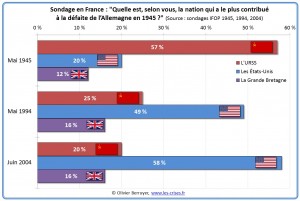You have probably seen the following graphic but it bears repeating:
The image is from: Who contributed most to the defeat of Nazi Germany in 1945?
From the post:
A survey conducted in May 1945 on the whole French territory now released (confirming a survey in September 1944 with Parisians) showed that interviewees appear well aware of the power relations and the role of allies in the war, despite the censorship and the difficulty to access reliable information under enemy’s occupation.
A clear majority (57%) believed that the USSR is the nation that has contributed most to the defeat of Germany while the United States and England will gather respectively 20% and 12%.
But what is truly astonishing is that this vision of public opinion was reversed very dramatically with time, as shown by two surveys conducted in 1994 and 2004. In 2004, 58% of the population were convinced that USA played the biggest role in the Second World War and only 20% were aware of the leading role of USSR in defeating the Nazi.
This is a very clear example of how the propaganda adjusted the whole nation’s perception of history, the evaluation of the fundamental contribution to the allied victory in the World War II.
Whether this change in attitude was the result of “propaganda” or some less directed social process I cannot say.
What I do find instructive is that over sixty (60) years, less than one lifetime, public perception of the “truth” can change that much.
How much greater the odds that the “truth” of events one hundred years ago are different from the ones we hold now.
To say nothing of the “truth” of events several thousand years ago, which we have reported only a handful of times, reports that have been edited to suite particular agendas.
Or we have some physical relics that occur at one location, sans any contemporaneous documentation, which we would not understand in its ancient context but in ours.
That should not dissuade us from writing histories, but it should make us cautious about taking action based on historical “truths.”
I most recently saw this in a tweet by Anna Pawlicka.
